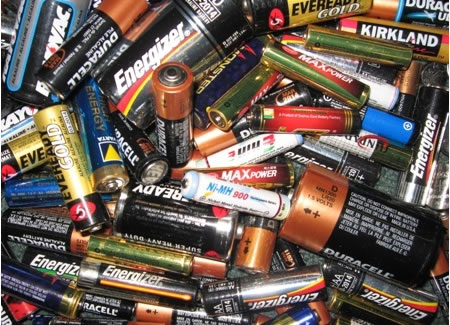Battery recycling

Do you remember the time before mobile phones were invented? Seems like a lifetime away doesn’t it? Yet with the invention of innovative gadgets comes the inevitable newer models being created each year. Mobile phones, Mp3 Players, laptops, power tools, all have to be powered by a battery of some sort. Then when the newer gadgets arrive, we simply throw out the outdated models and their batteries.
That’s the problem right there. Batteries.
Each year the average British household uses up to 21 batteries, and if these old batteries aren’t sitting in your kitchen drawer releasing carcinogenic substances, 600 million of these are pilling up on that every increasing landfill each year.
What damage do batteries do to humans and the environment?
Batteries contain sulphuric acid and lead. Both of these materials can damage the environment and pose a safety hazard if handled incorrectly.
About one-quarter of the average lead-acid battery is composed of sulphuric acid. Sulphuric acid is a corrosive liquid which can sterilise soils and cause severe burns to skin. Also, sulphuric acid mists are a suspected carcinogen.
Another two-thirds of the average battery is made up of lead or lead compounds. Lead, a heavy metal, can be fatal if ingested or absorbed through the skin. In the environment, lead does not degrade naturally and can accumulate, causing soil and ultimately our drinking water to become contaminated. This affects not only wildlife and our dying ecosystem but us humans too.
So what can you do to help the environment?
Use the mains when possible.
Use rechargeable batteries and a battery charger, doing so saves energy because the energy needed to manufacture just one battery is on average 50 times greater than the energy it gives out.
Try to use household appliances that can use power derived from the sun via solar panels or from a winding mechanism, e.g. radios, mobile phone wind-up chargers.
Participate in local authority battery collection schemes where they are available. If you Council does not provide one at the moment, contact them and find out if they are planning to do so in future.
If your place of work does not have a battery recycling scheme in place then they could be breaking the law. Stricter rules on manufacturing and recycling batteries and accumulators (rechargeable batteries) for UK businesses have been introduced through the implementation of the European Batteries Directive.
The regulations affect any business that uses produces, supplies, or disposes of batteries, as well as any business that manufactures or designs battery-powered products.
Specifically, the regulations affect the following businesses:
manufacturers
importers
distributors
end-users (virtually every business in the UK)
businesses involved in treating and recycling waste batteries and accumulators
Vehicle sales and maintenance businesses.
Seek guidance on how to dispose or recycle batteries from either the distributor who originally supplied the battery, the battery manufacturer or the appliance manufacturer.
Recycling our old batteries is the only way to ensure our planet’s survival.
If you want to do your bit to help the planet, look out for your local battery recycling collection point.